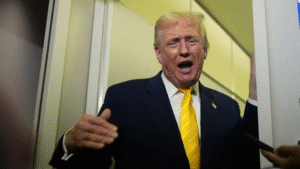Immediate Impact of Trump’s Tariffs on the U.S. Economy
This reflects the rapid changes caused by President Trump’s recent tariff policies. These tariffs, designed to protect U.S. manufacturing, have ignited a firestorm of economic consequences, from market volatility to consumer price hikes. As tariffs go into effect, businesses and consumers must prepare for potential disruptions that could affect the U.S. economy for years to come.
Market Volatility: Understanding Investor Reactions to Tariffs
What Is Market Volatility? Market volatility refers to the fluctuations in the stock market caused by uncertainty. When news, such as tariffs, hits the market, investors react quickly, which can cause sharp swings in stock prices.
- Investor Sentiment: With tariffs imposed on imports, especially on technology and manufacturing products, markets fear slower growth. The tariffs could increase the cost of goods, which would reduce corporate profits.
- Economic Impact: In the short term, volatility is expected to continue as investors assess how tariffs will affect industries, businesses, and consumers.
Table: Market Reaction to Tariffs
| Index | Pre-Tariff Value | Post-Tariff Drop | Impact on Investor Sentiment |
|---|---|---|---|
| Dow Jones | 35,000 | 33,500 | -4.3% |
| Nasdaq-100 | 13,500 | 12,800 | -5.2% |
| S&P 500 | 4,100 | 3,900 | -4.9% |
Inflation and Rising Consumer Prices: What U.S. Consumers Can Expect
How Do Tariffs Lead to Price Increases? Tariffs are essentially taxes on imports, which make foreign goods more expensive. When companies face higher production costs, they pass those costs on to consumers in the form of price hikes.
- Price Increase on Essential Goods: U.S. consumers are already seeing price hikes on products like electronics, automobiles, and groceries. This is due to higher production costs caused by the tariffs.
- Inflation Concerns: Economists predict that inflation will rise, affecting the purchasing power of U.S. households.
How Tariffs Impact Consumer Prices
Tariffs on Imports
|
--------------------------
| |
Increased Costs Higher Prices for Consumers
in Production (Groceries, Cars, Electronics)
|
Pass on Costs to Businesses
|
Price Hikes for U.S. Consumers
Long-Term Economic Impact: How Tariffs Could Lead to a Recession
What Are the Recession Risks? The long-term impact of tariffs could be a significant economic slowdown, as businesses are forced to deal with increased costs and reduced consumer spending.
- Job Losses: As industries face higher production costs, some may cut jobs to maintain profitability, leading to higher unemployment rates.
- Slowdown in Economic Growth: Experts predict that GDP growth could slow down due to the uncertainty caused by tariffs. Economic forecasts have already been downgraded, with recession fears looming.
Data: Projected U.S. Economic Growth Impact Due to Tariffs
| Institution | 2025 GDP Growth Forecast (Before Tariffs) | 2025 GDP Growth Forecast (After Tariffs) |
|---|---|---|
| Goldman Sachs | 2.5% | 2.0% |
| J.P. Morgan | 2.7% | 2.3% |
| Federal Reserve | 2.4% | 2.0% |
Comparing Past Trade Policies: Lessons from Trump’s First Term
How Have Previous Tariffs Affected the U.S. Economy? Looking back at President Trump’s first term, the imposition of tariffs sparked significant economic uncertainty. During the China-U.S. trade war, stock markets suffered, and inflation surged, much like what we are seeing now.
- Previous Volatility: In 2018, the Dow Jones fell by 724 points, or 2.9%, following tariff announcements.
- Similar Effects: The current tariffs echo those from the first term, raising fears of another protracted trade conflict.
Conclusion: Navigating the Economic Uncertainty Ahead
How Should U.S. Consumers and Businesses Respond? As we move forward, both businesses and consumers must adjust to the new economic realities shaped by tariffs. Here’s what they can do:
- Businesses: Reevaluate supply chains, find local alternatives, and adjust pricing strategies.
- Consumers: Be mindful of price increases and consider ways to budget for rising costs.
The road ahead will be challenging as the tariffs continue to shape the U.S. economy. However, staying informed will help businesses and consumers make the best decisions during this uncertain time.
[USnewsSphere.com / fr.]





